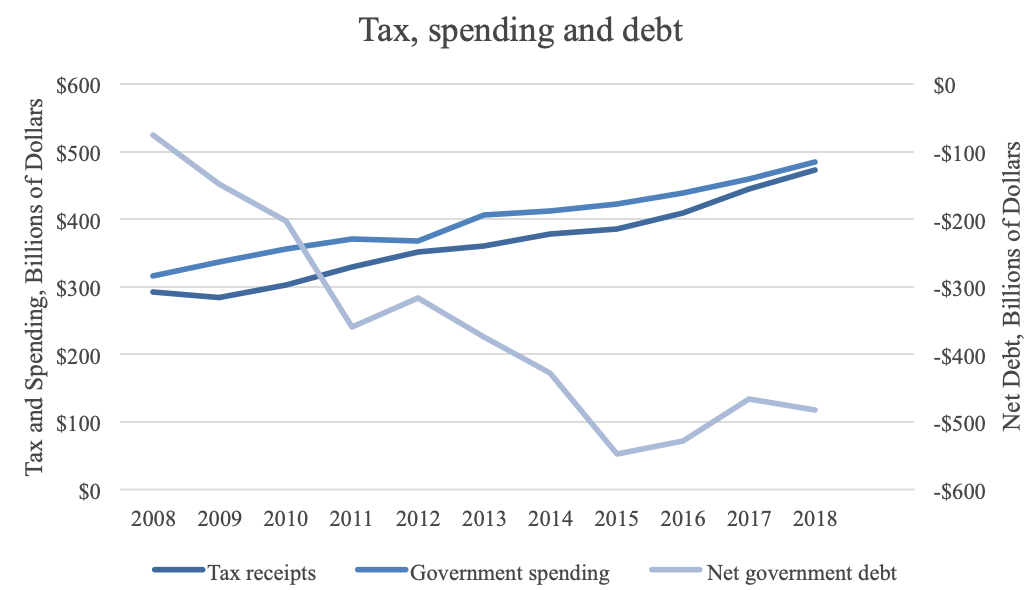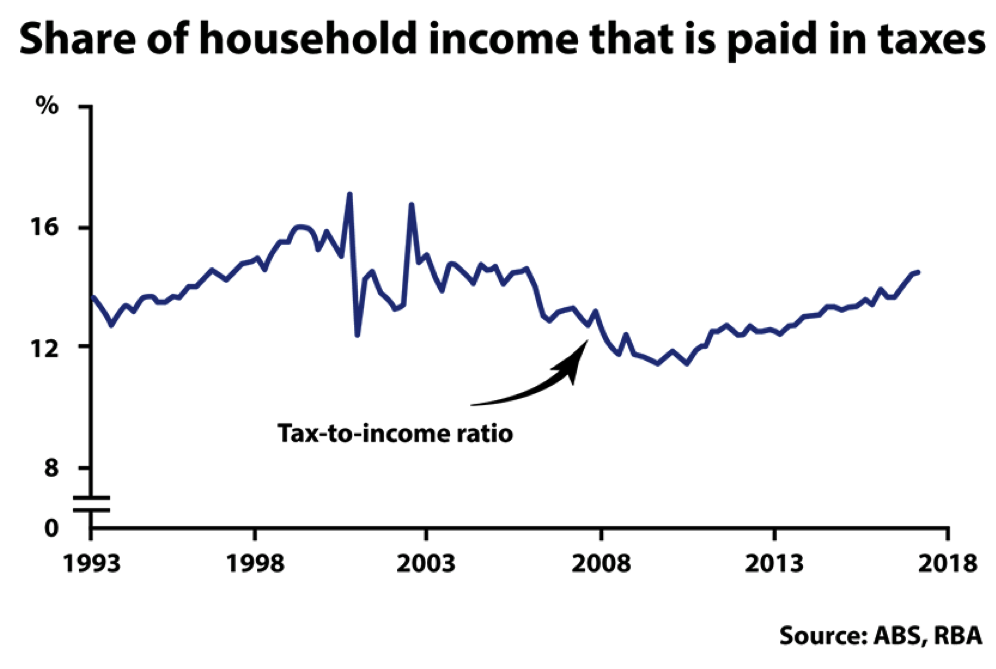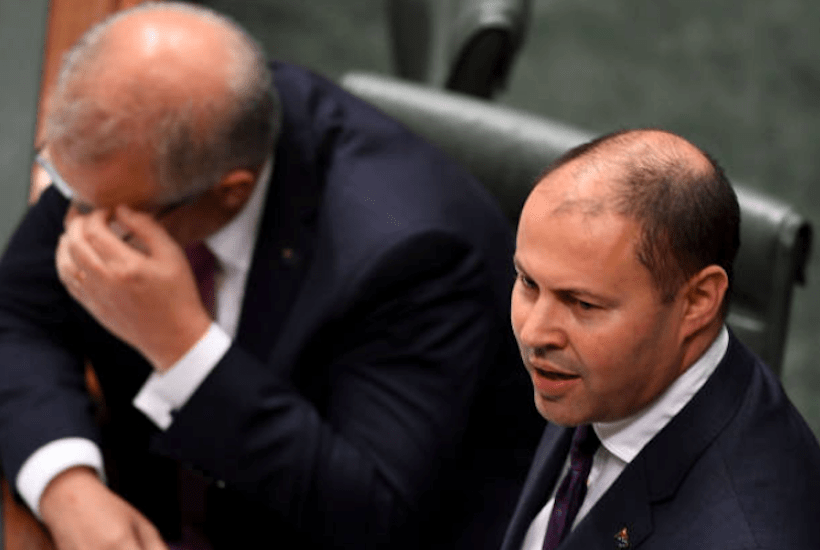After over a decade of abysmal federal budgets, Scott Morrison is set to announce a budget surplus today. I expect a surge of Google searches for what exactly a ‘budget surplus’ is, given that people under 30 have probably never heard of one in their lifetime as an eligible voter.
While a sensible budget bottom line is long overdue, there is little reason to celebrate. Morrison claims that it has taken “more than 10 years” to bring the budget back under control, the result of “sheer determination and will”. The heroic story sounds nice, but there’s not much truth to it.
Data compiled from the 2018-19 Federal Budget, and the Parliament of Australia shows that from (financial years) 2008-09 to 2018-19, a budget deficit was delivered each year, net government debt increased from just under 6 per cent of GDP to around 25.4 per cent of GDP, and in all years bar two, politicians were given a pay rise.
 Astonishingly in 2012 they were given two rises, one for 31.3 per cent and another for three per cent just four months later. That politicians can receive pay rises while delivering such poor budgetary outcomes is absurd. To do their bit in assisting the budget, their pay should be frozen after delivering multiple budget deficits. If they had done this in 2009, their salary today (after accounting for inflation) would still be more than double the average salary of ordinary Australians.
Astonishingly in 2012 they were given two rises, one for 31.3 per cent and another for three per cent just four months later. That politicians can receive pay rises while delivering such poor budgetary outcomes is absurd. To do their bit in assisting the budget, their pay should be frozen after delivering multiple budget deficits. If they had done this in 2009, their salary today (after accounting for inflation) would still be more than double the average salary of ordinary Australians.
While politicians have seen a cosy annual base-pay increase of 5.7 per cent each year since 2009, the share of household tax-to-income ratio has been on a steady rise.
This graph, courtesy of the IPA, shows that the tax-to-income ratio is at the highest level since before the last budget surplus was delivered. The Reserve Bank of Australia have also highlighted the high-tax regime, noting that “in the past year, taxes paid by households increased by around 8 per cent, more than double the rate of growth in gross household income of 3½ per cent”.
 A budget surplus delivered through increased taxes is not something to be proud of. Yet this is exactly what is happening. The two graphs above show that Morrison is leading the biggest-spending and highest-taxing government Australia has ever seen.
A budget surplus delivered through increased taxes is not something to be proud of. Yet this is exactly what is happening. The two graphs above show that Morrison is leading the biggest-spending and highest-taxing government Australia has ever seen.
A decade of fiscal mismanagement, from both major parties, has resulted in an enormous public debt that the Coalition is not serious about paying down. Tax receipts have boomed in recent years, but higher levels of spending rather than being used to reduce the debt are matching them just as quickly.
Morrison and Josh Frydenberg are right to insist, “this is not a time for cash splashes” but “for responsible spending”. Why do they not heed their own advice then?
Other than increased taxes on ordinary Australians, another major contributor to the surplus has been rallying iron ore prices. These are an unstable source of revenue and should not be relied upon however.
Deloitte Access Economics warned in mid-March that the government should not lock itself into higher levels of spending or bringing forward tax cuts just because there is a temporary boost in commodities-related revenue. It appears as though Morrison will ignore this advice in a shameless competition with a high tax-and-spend Labor Party.
On Sunday, the Coalition announced their latest vote-buying policy of giving a one-off payment to assist around four million Australians with rising power prices. The policy, which would see singles receive $75 and couples $125, fails to the root cause of cost of living concerns and seems to be exactly the kind of “cash splash” are condemning.
Creating policy certainty, removing the ban on nuclear energy, and removing renewable energy subsidies would make power cheaper for Australians. These, along with other cost of living policies, mainly tax cuts, are what the Coalition should be pursuing to help ordinary Australians. If they did so, they would set themselves aside as a party that stands for less government interference and shameless vote-buying.
Australians who are struggling with a rising cost of living and stagnant wages would welcome tax cuts, but the small surplus generated in this budget should not be squandered on them. Increasing spending in an effort to win votes should be absolutely out of the question.
Introducing tax cuts without reducing spending will be devastating for the budget and the case for sensible governance. This was the lesson learned the hard way by Ronald Reagan, and which Americans will again learn in coming years.
Morrison is in an uncomfortable position coming into the election, with a budget expected to deliver some tax cuts, increased spending, and a surplus. The focus, for now, should be on addressing government debt.
Over the weekend, Moody’s, the global ratings agency, encouraged both major parties to attend to the debt rather than commit to higher levels of spending. With net debt currently in the region of $482 billion it’s clear that the major parties have an issue with the purse strings.
Rather than parading around as though they are fantastic fiscal managers who can afford to be big spenders in the lead up to the federal election, the government should be ashamed of their economic management. Addressing debt is essential and will give room for necessary tax cuts. For either to occur, Morrison must get serious about reducing his government’s expenditure.
Cian Hussey is a Research Analyst at the Mannkal Economic Education Foundation.
Got something to add? Join the discussion and comment below.
Got something to add? Join the discussion and comment below.
Get 10 issues for just $10
Subscribe to The Spectator Australia today for the next 10 magazine issues, plus full online access, for just $10.


























Comments
Don't miss out
Join the conversation with other Spectator Australia readers. Subscribe to leave a comment.
SUBSCRIBEAlready a subscriber? Log in